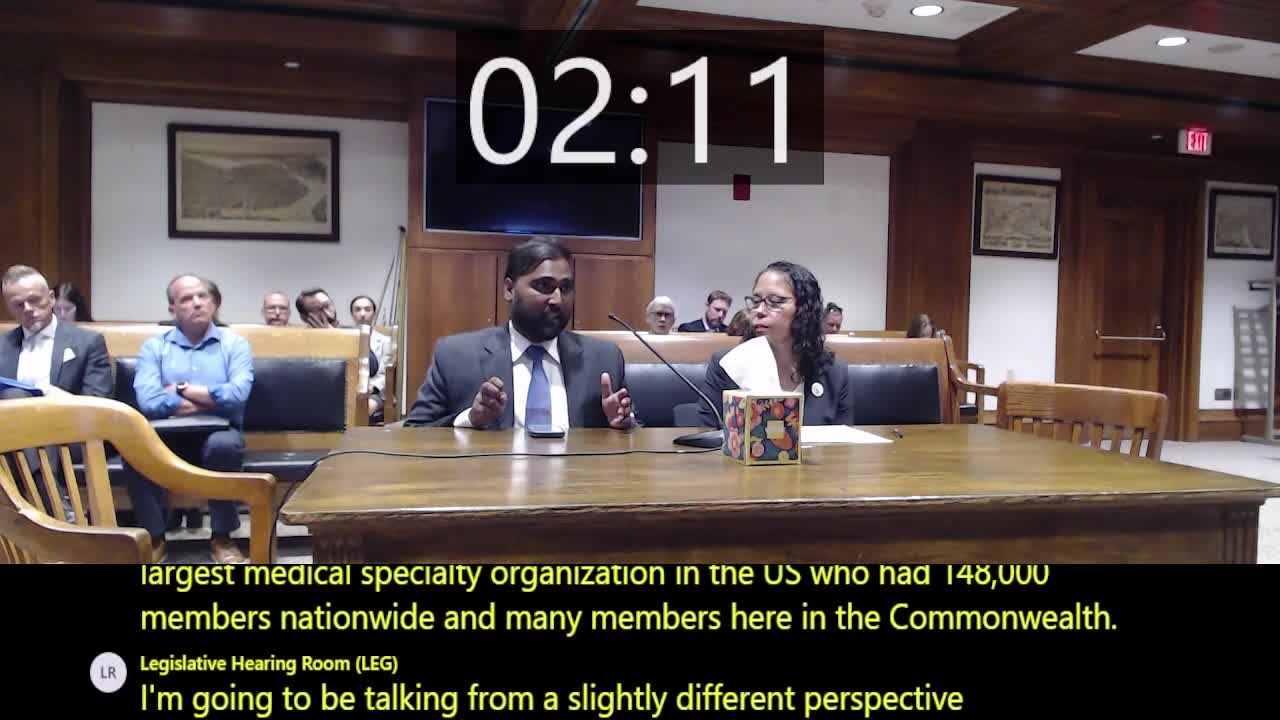Massachusetts internist warns of healthcare crisis due to primary care access shortages
June 23, 2025 | 2025 Legislature MA, Massachusetts
This article was created by AI summarizing key points discussed. AI makes mistakes, so for full details and context, please refer to the video of the full meeting. Please report any errors so we can fix them. Report an error »

The Joint Committee on Public Health convened on June 23, 2025, to address critical issues surrounding access to primary care in Massachusetts. A significant focus of the meeting was the alarming shortage of primary care providers, which has been exacerbated by insufficient investment in the field, increased retirements, and a decline in new medical graduates entering primary care specialties.
During the session, a hospital-based internist highlighted the detrimental effects of this shortage, noting that many patients are delaying or avoiding necessary preventive care. This delay often leads to severe health complications that require hospitalization, ultimately increasing healthcare costs. The internist cited statistics from the American Hospital Association, revealing a 17.5% rise in hospital expenses and a 32% increase in emergency room costs from 2019 to 2022, a trend worsened by the COVID-19 pandemic.
The internist shared personal anecdotes illustrating the human impact of inadequate primary care access. He described cases of patients who suffered severe health crises due to a lack of timely intervention, emphasizing that many hospitalizations could have been avoided with better primary care management.
The committee discussed House Bill 2537 and its companion Senate bill, which aim to address these pressing issues by improving access to primary care. The Massachusetts chapter of the American College of Physicians expressed strong support for the legislation, underscoring the need for systemic changes to enhance primary care availability and reduce reliance on costly inpatient care.
The meeting also touched on the role of hospitalists, who manage patient care during hospital stays. The internist explained that while hospitalists coordinate care, they often face challenges in ensuring patients can follow up with their primary care providers after discharge due to scheduling difficulties and insurance limitations.
In conclusion, the committee's discussions highlighted the urgent need for legislative action to strengthen primary care access in Massachusetts. The implications of these efforts are profound, as improving primary care could lead to better health outcomes and reduced healthcare costs for the state’s residents. The committee expressed its commitment to advancing the proposed bills and addressing the ongoing challenges in the healthcare system.
During the session, a hospital-based internist highlighted the detrimental effects of this shortage, noting that many patients are delaying or avoiding necessary preventive care. This delay often leads to severe health complications that require hospitalization, ultimately increasing healthcare costs. The internist cited statistics from the American Hospital Association, revealing a 17.5% rise in hospital expenses and a 32% increase in emergency room costs from 2019 to 2022, a trend worsened by the COVID-19 pandemic.
The internist shared personal anecdotes illustrating the human impact of inadequate primary care access. He described cases of patients who suffered severe health crises due to a lack of timely intervention, emphasizing that many hospitalizations could have been avoided with better primary care management.
The committee discussed House Bill 2537 and its companion Senate bill, which aim to address these pressing issues by improving access to primary care. The Massachusetts chapter of the American College of Physicians expressed strong support for the legislation, underscoring the need for systemic changes to enhance primary care availability and reduce reliance on costly inpatient care.
The meeting also touched on the role of hospitalists, who manage patient care during hospital stays. The internist explained that while hospitalists coordinate care, they often face challenges in ensuring patients can follow up with their primary care providers after discharge due to scheduling difficulties and insurance limitations.
In conclusion, the committee's discussions highlighted the urgent need for legislative action to strengthen primary care access in Massachusetts. The implications of these efforts are profound, as improving primary care could lead to better health outcomes and reduced healthcare costs for the state’s residents. The committee expressed its commitment to advancing the proposed bills and addressing the ongoing challenges in the healthcare system.
View full meeting
This article is based on a recent meeting—watch the full video and explore the complete transcript for deeper insights into the discussion.
View full meeting
